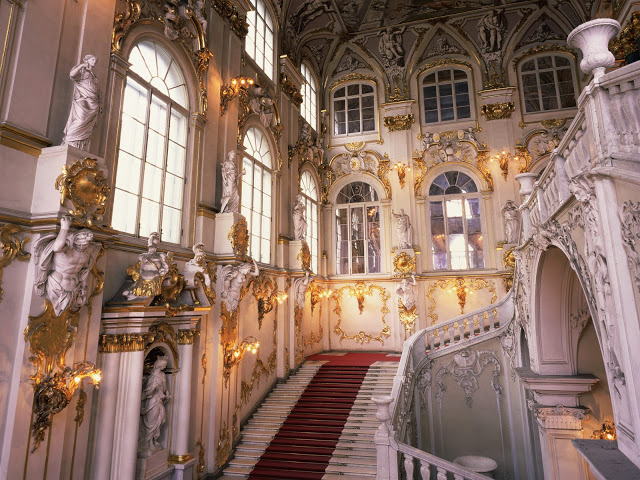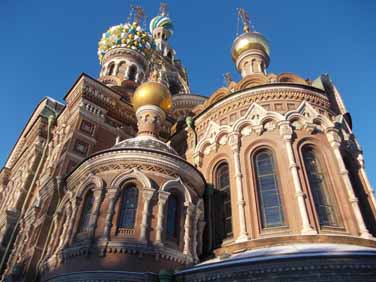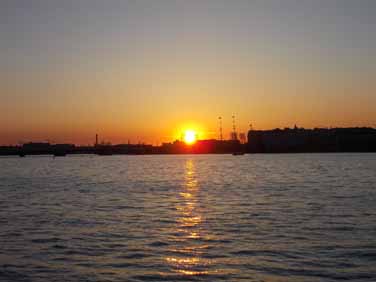
![]()
Welcome • |
About
Us • |
The International Writers Magazine: Russia
• Fi McIntyre
I’d been working in St Petersburg as an English teacher for four months when my parents decided it was high time for a visit.
“We’ll see what happens,” says my mum over Skype, apprehension still visible on her pixelated face, “If the situation stays the same, we’ll come. If it changes…well. We’ll see.”
“What’s the food like? Do I need thermals? How do I say ‘two beers, please’ in Russian?” were among the myriad questions I was asked.
Having never been to Russia they were like students embarking on an adventure to the depths of an uncharted rainforest: unbearably over-excited.
Then Crimea changed hands.
Over the next few weeks their news was filled with Russian aggression and bullying, reports of violence and rumblings of a new cold war. Their enthusiasm waned; they stopped asking questions. Suddenly my country of residence was a source of anxiety.
“Are you OK out there? I mean, being British? Are people giving you a hard time about the sanctions? If you feel at all uncomfortable there, even for a second, you jump straight on a plane and come home, alright?”
Truth is, I felt fine. My students were still friendly, my landlady still fed me. My friends still took me to the best bars in the city. Most St Petersburgians had little to no opinion on the British and their sanctions. They were locked in their own domestic battle of belief over Crimea. I know friends who have stopped talking, families who have started fighting, all over that little piece of land with its long and hopelessly divided history.
To cut a long story short, my parents decided to come to St Petersburg. After a long day at work I met them in the lobby of their hotel and they greeted me enthusiastically with stories about the friendliness of the locals they had encountered so far. I don’t know what they expected – perhaps mud slung at them and shouts of, “Go home, sanctioners!”
We ate at a restaurant with English menus on Nevsky Prospekt, the main street in St Petersburg. Determined to fit in my parents ordered borsch and pickled herring with a side helping of cabbage ‘pirozhkiy’ (mini pies) and cherry dumplings to finish. Shockingly, they enjoyed it immensely.
“This is lovely,” said my mum, happily sipping on her third glass of wine. “The food’s great, and the waiters are so friendly too. To be honest I was expecting a bit of hostility, you know, what with being British when we’ve sanctioned them all over Crimea."
“Shh!” said my dad, looking round furtively. “Keep your voice down.”
Over the week we saw just about every major tourist attraction in St Petersburg thanks to my dad and his militaristic attitude to sightseeing. First the Hermitage with its Room of Requirement-style collection of wonders slotted into every space available, then to the imposing Marble Palace and a quick peek at the Engineer’s Castle, where the hapless Paul I lasted for forty days in his anti-assassination fortress before being strangled by his bodyguards.
Image: Hermitage Grand StaircaseSt Petersburg’s palaces are pretty impressive examples of wealth. On seeing (what felt like) the hundredth gilded ball room with several glittering chandeliers scraping the heads of those below my mum turned to me and whispered behind her hand, “All that grandeur, imagine the cost! No wonder they had a revolution…” Immediately glancing round to see if she’d offended anyone she saw my dad striding towards us in zealous agitation. “Got photos? Good. Next one.”
And off we went, him leading the way with the guidebook in his hand.
Aside from fantastic palaces, St Petersburg also has some beautiful churches and cathedrals including the fittingly named Church of Our Saviour on Spilled Blood, which was built as a monument to Alexander II around the site of his assassination. The interior is covered in extraordinarily detailed mosaics which took two sets of people years to create – one original, one restoration after the war.
On leaving the church we were stopped by a woman conducting a customer satisfaction survey (Russia is trying to improve its customer service experience, going so far as to employ foreign experts in hospitality who speak little or no Russian).She pleasantly and politely asked us what we thought of the employees at the ticket office. The girl who’d served us was very smiley and didn’t skip a beat when my dad (somewhat rudely I feel) addressed her in colloquial and heavily accented English without even attempting to use one of his Russian tourist phrases. With her in mind, we answered, “Oh yes, the girl was very friendly.”
The woman raised her eyebrows in surprise. “Friendly?” she repeated, and hastily scribbled it down before we could change our minds.
To my parents’ admiration the theme of friendliness continued in all the establishments we visited, culminating in the Russian Vodka Museum.
This under-appreciated gem of Russian kitsch is a little way from St Isaac’s Cathedral and is well worth a visit. For starters, when we arrived there was a bear outside. Not a statue of a bear. An actual, living bear. Wearing a skirt. Being fed honey from a bottle held by a man in a pair of black trousers and a flamboyant red shirt. I’ve asked several native St Petersburgians since the incident whether it’s normal, and they’ve all replied in shock that they’ve never seen a bear in their lives. I would have dismissed it as a hallucination had the owner of the museum not come running out and shooed them away. The museum is attached to a restaurant which serves surprisingly good food, including a large platter of ‘vodka snacks’ with salted and pickled cucumbers, pickled cabbage and wild marinated mushrooms. Sounds disgusting but they do go surprisingly well with vodka.
After sampling a few of the local tipples we tottered into the museum, which did not disappoint. We saw shot glasses and vodka bottles galore, and giggled tipsily at a clumsy model of a chemist with his eyes pointing in different directions. He’d clearly enjoyed too much of his new invention.
On the last night my parents were invited to my flat for dinner. Knowing that my landlady’s mother, with whom I live, is a massive fan of Britain (Churchill, Diana and, somewhat perplexingly, Thatcher rank high on her list of idols) I’d asked them to bring some little treats from England, which I’d given to her a few nights before. Overcome with gratitude she’d insisted that they eat with us. And so on their last night in Russia, a few minutes’ walk from my flat, my parents’ anxieties surfaced again.
“What if they ask us about Crimea?” hissed my mum worriedly. “Or the situation in the rest of the Ukraine?”
“Don’t say ‘the’ Ukraine, just say ‘Ukraine’, they don’t like the ‘the’” my dad hissed back.
“See? I’ll put my foot in it, I know I will. If they ask me I’ll say I don’t know much about it. Or will they think me ignorant?”
“Just say you don’t think we should be involved and it’s their business,” said my dad, “they’ll like that.”
“Well,” sniffed my mum, “that’s what I do think, actually, it is their business, I mean, who do we think we are – “
She was cut off by my key turning in the lock and swinging the door out to reveal the smiling, welcoming faces of my landlady and her mother.
We enjoyed a fantastic evening full of hearty Russian food, good wine and laughter. About halfway through the evening my landlady turned to my parents and asked good-naturedly, “What do you think about the situation in Crimea? Do you agree with the sanctions? I’m just curious.”
An awkward silence followed. “Well…” my mum faltered after a moment, “I don’t really know much about it.”
“No,” added my dad quickly, “neither do I. And anyway, it’s none of our business really.”
My landlady nodded. “Interesting. You know, it’s very divisive here…”
We discussed it for hours. Not a word was uttered disrespectfully or in bad temper and we all parted at the end of the evening warmly with my parents promising to come back again. They went back to the UK having had a fantastic time in this enigmatic and beautiful city, knowing that despite what several major news sources would have you believe, most Russians are a warm and welcoming bunch who want to be friends rather than enemies. Oh, and they have really good vodka.
© Fi McIntyre May 2014





